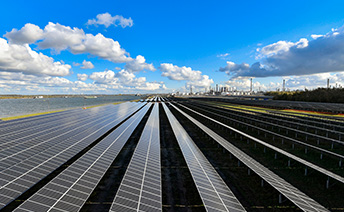American Chemistry Council (ACC)
ACC represents chemical manufacturers in the USA. Its mission is to deliver value to members through advocacy, member engagement, communications and scientific research.[1]
Membership of board/executive committee: Shell is a member of the executive committee and board of directors.
- 2022 assessment outcome: Aligned
- 2021 assessment outcome: Aligned
Summary
Shell benefits from its membership of ACC, particularly in relation to its federal- and state-level advocacy on topics such as chemical management, product stewardship, trade policy, transport and infrastructure. We value ACC’s Responsible Care programme that helps members to enhance environmental, health, safety and security performance. We also support ACC’s Roadmap to Reuse and advanced recycling programme.
We have found ACC to be aligned with our climate and energy transition-related policy positions.
We will encourage ACC to:
- Explicitly state support for net-zero emissions by 2050.
- Support reducing methane emissions throughout the natural gas supply chain through direct regulations such as performance standards based on robust monitoring, reporting and verification frameworks.
We will remain a member of ACC. We will continue to engage the association on climate and energy transition topics. We will continue to track alignment between ACC’s climate and energy transition-related positions and our own.
Further information
Click on the sections below to read more.
- ACC welcomed the US recommitment to the Paris Agreement.[2] [3] ACC is a member of the International Council of Chemical Associations, which has stated that it “fully supports the Paris Agreement and the ambition to achieve a climate neutral world by mid-century”.[4] ACC has not explicitly stated a position on net-zero emissions.
- ACC stated support for energy and climate provisions in the Inflation Reduction Act of 2022.[5] [6]
- ACC has stated support for carbon pricing, including carbon border adjustments to prevent carbon leakage.[7]
- ACC has stated support for energy and process efficiency to reduce greenhouse gas emissions.[8]
- ACC has stated support for Congress to “increase federal funding to encourage the private-sector to improve building energy efficiency”.[9]
- In 2022, ACC wrote to the Senate Committee on Homeland Security and Governmental Affairs to oppose legislation that would have weakened energy efficiency standards, saying “ACC strongly opposes using federal taxpayer dollars to make buildings less energy efficient.”[10]
- In 2022, ACC’s President and CEO stated: “We’re calling on Congress to increase funding to encourage improvements in building energy efficiency and deployment of next-generation automobiles and infrastructure, as well as to enact measures to speed transition to newer, more efficient appliances.”[11]
- ACC has stated support for low-carbon hydrogen and recognises the different ways it can be produced.[12]
- ACC has stated that Congress can help enable a lower-emissions future for American manufacturers, by establishing “a technology-neutral incentive for production of low carbon hydrogen”.[13]
- In December 2022, ACC provided a submission to the Department of Energy’s Draft National Clean Hydrogen Strategy, stating that “ACC and its members have appreciated the thoughtful, inclusive process DOE is taking in developing and implementing an economy-wide clean hydrogen strategy.[14]
- In December 2022, ACC provided comments to the Internal Revenue Service about credits for clean hydrogen, stating that “the IRA tax incentives could provide an early and essential foundation for action by chemical manufacturers and other energy intensive, trade-exposed, and hard-to abate industries.”[15]
- In December 2022, ACC stated support for the Hydrogen for Industry Act, which supports the adoption of hydrogen as an emissions reduction technology for heavy industry.[16]
No position
- ACC has stated that “CCUS will be important to mitigate the carbon intensity of heavy manufacturing, including chemical production”, and that “the U.S. will need continued investment in [CCUS] technology and a sound regulatory and legal framework that provides the clarity and certainty to create markets and encourage private investment.”[17]
- In December 2022, ACC provided comments to the Internal Revenue Service about credits for carbon sequestration, stating that “the IRA tax incentives could provide an early and essential foundation for action by chemical manufacturers and other energy intensive, trade-exposed, and hard-to abate industries.”[18]
- ACC has stated support for climate-related information reporting.[19]
- ACC does not have a stated position on sustainable finance taxonomies.
- In its 2022 response to the SEC’s proposed rule on climate-related disclosures, ACC stated support for “a company-specific, principles-based approach to climate-related information reporting, building off existing climate change frameworks and guided by materiality to focus on disclosures that are relevant and material to investors and shareholders without impeding the competitive marketplace”.[20] ACC stated concerns with the SEC’s proposal and offered recommendations.[21] Shell stated support for the SEC’s proposal, but also noted a number of concerns.
No position
- In a 2022 submission to the DOE on Industrial Decarbonization Priorities, ACC identified electrification as an option for decarbonisation and stated that “new low or no-emissions energy sources, and electrification of chemical manufacturing processes hold promise, but these technologies are still in the development stage.”[22]
- ACC has stated support for policies that recognise natural gas as a partner for renewable sources.[23]
- In 2021, ACC opposed the government’s proposed methane fee on the basis that it would duplicate existing EPA methane regulation.[24] Shell stated support for a workable methane fee.
- ACC has not stated a position on ending routine flaring.
- ACC has stated support for the “deployment of next-generation automobiles and associated infrastructure, with an emphasis on domestic manufacturing of components”.[25] It highlights the following suggested measures: “clean transportation infrastructure buildout (electricity, biofuels, etc.)”; “policies that encourage the purchase of newer, more efficient vehicles”; and “policies and programs that continuously explore opportunities to reduce transportation-related emissions and improve fuel economy”.[26] ACC has also stated support for President Biden’s Executive Order that set a target to make half of all new vehicles sold in 2030 zero-emission vehicles.[27]
No position
- ACC has stated support for the “increase in government investment & scientific resources to develop & deploy low emissions technologies in the manufacturing sector”.[28]
- In response to the Department of Energy’s 2022 Request for Information on reducing greenhouse gas emissions in the manufacturing sector, an ACC statement stated that a “comprehensive strategy to continue to reduce emissions across the industry should adopt a lifecycle approach, including upstream fuel and feedstock emissions, manufacturing process emissions, energy emissions from fuel and steam, energy emissions from electricity, avoided carbon during the use phase, and end-of-life or recycling phases.”[29]
No position
No position
[1] https://www.americanchemistry.com/about-acc
[2] https://www.americanchemistry.com/chemistry-in-america/news-trends/blog-post/2021/countdown-to-climate-summit-begins
[3] https://www.americanchemistry.com/better-policy-regulation/climate-change/resources/acc-policy-recommendations-for-a-lower-emissions-future
[4] https://icca-chem.org/news/icca-statement-on-climate-policy/
[5] https://www.americanchemistry.com/better-policy-regulation/energy/resources/acc-comments-on-treasury-notices-re-clean-hydrogen-fuel-co-sequestration-and-clean-vehicles
[6] https://cen.acs.org/policy/legislation-/Inflation-Reduction-Act-chemistry/100/web/2022/08
[7] https://www.americanchemistry.com/better-policy-regulation/climate-change/resources/acc-policy-recommendations-for-a-lower-emissions-future
[8] https://www.americanchemistry.com/better-policy-regulation/climate-change/resources/acc-policy-recommendations-for-a-lower-emissions-future
[9] https://www.americanchemistry.com/better-policy-regulation/climate-change/resources/acc-policy-recommendations-for-a-lower-emissions-future
[10] https://www.americanchemistry.com/better-policy-regulation/energy/resources/acc-letter-opposing-hr-5673-storm-technical-corrections-act
[11] https://www.americanchemistry.com/chemistry-in-america/news-trends/blog-post/2022/being-climate-smart-and-energy-smart-go-hand-in-hand
[12] https://www.americanchemistry.com/better-policy-regulation/climate-change/resources/acc-policy-recommendations-for-a-lower-emissions-future
[13] https://www.americanchemistry.com/better-policy-regulation/climate-change/resources/acc-policy-recommendations-for-a-lower-emissions-future
[14] https://www.americanchemistry.com/better-policy-regulation/energy/resources/acc-comments-on-doe-draft-clean-hydrogen-strategy-and-roadmap
[15] https://www.americanchemistry.com/better-policy-regulation/energy/resources/acc-comments-on-treasury-notices-re-clean-hydrogen-fuel-co-sequestration-and-clean-vehicles
[16] https://www.americanchemistry.com/chemistry-in-america/news-trends/press-release/2022/acc-welcomes-the-hydrogen-for-industry-act
[17] https://www.americanchemistry.com/better-policy-regulation/climate-change/resources/acc-policy-recommendations-for-a-lower-emissions-future
[18] https://www.americanchemistry.com/better-policy-regulation/energy/resources/acc-comments-on-treasury-notices-re-clean-hydrogen-fuel-co-sequestration-and-clean-vehicles
[19] https://www.americanchemistry.com/better-policy-regulation/climate-change/resources/acc-comments-on-sec-climate-related-disclosures-proposal
[20] https://www.americanchemistry.com/better-policy-regulation/climate-change/resources/acc-comments-on-sec-climate-related-disclosures-proposal
[21] https://www.americanchemistry.com/better-policy-regulation/climate-change/resources/acc-comments-on-sec-climate-related-disclosures-proposal
[22] https://www.americanchemistry.com/better-policy-regulation/climate-change/resources/acc-response-to-doe-rfi-on-reducing-ghgs-in-manufacturing
[23] https://www.americanchemistry.com/better-policy-regulation/energy/resources/acc-comments-on-ferc-proposed-natural-gas-policies
[24] https://www.americanchemistry.com/better-policy-regulation/tax/resources/why-congress-should-not-enact-the-proposed-methane-tax
[25] https://www.americanchemistry.com/better-policy-regulation/climate-change/resources/acc-policy-recommendations-for-a-lower-emissions-future
[26] https://www.americanchemistry.com/better-policy-regulation/climate-change/resources/acc-policy-recommendations-for-a-lower-emissions-future
[27] https://www.americanchemistry.com/chemistry-in-america/news-trends/press-release/2021/plastic-makers-welcome-president-biden-s-50-by-2030-goal-for-electric-vehicles
[28] https://www.americanchemistry.com/better-policy-regulation/climate-change/resources/acc-policy-recommendations-for-a-lower-emissions-future
[29] https://www.americanchemistry.com/content/download/10704/file/ACC-Response-to-DOE-RFI-on-Reducing-GHGs-in-Manufacturing.pdf










